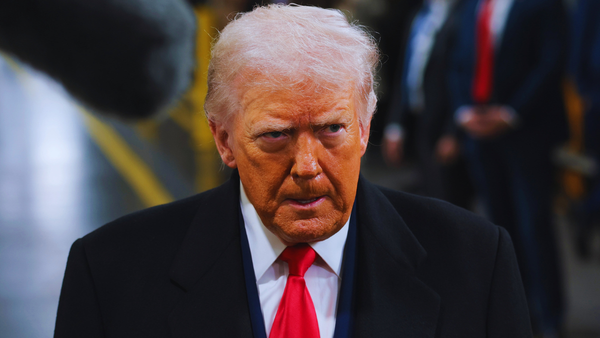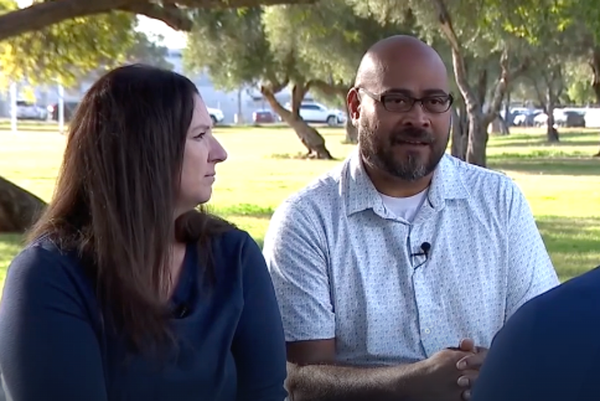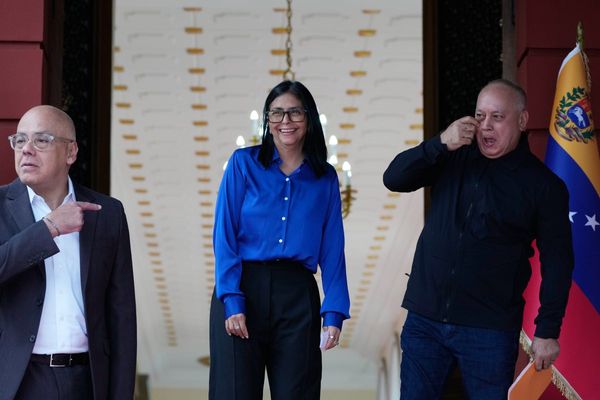
The mayor of Caracas had come to one of her city’s busiest tube stations wearing a camouflage T-shirt declaring herself a card-carrying combatant – and with a message to match.
“They think they’re the owners of the world,” Carmen Meléndez complained of the Trump administration and its pressure campaign against Venezuela’s government. “But if they dare [to invade] we’ll be waiting for them here.”
Meléndez said she hoped a US invasion was not on the horizon, even though they had shown themselves to be “a bunch of crazies, who are capable of anything”. “But if it does happen we are ready,” she added, “and we will use all of the weapons we have to defend the homeland.”
Mayor Meléndez was at La Rinconada station to supervise an early morning drill: a practice response to fictitious cyber-attack on the Caracas underground that had brought its trains to a halt.
The rehearse evacuation, ordered by President Nicolás Maduro as part of a nationwide “civil protection and preparation of the people” exercise, came as Donald Trump turned the heat up on Venezuela’s leader to levels rarely seen before.
Since early August, when Trump signed a secret directive authorizing military action against Latin American drug cartels, the US president has labelled Maduro a “narco-terrorist” fugitive and advertised a $50m reward for his arrest; deployed marines and warships off Venezuela’s Caribbean coast; and ordered at least four deadly strikes on alleged drug smuggling boats, which have killed at least 21.
Last week Trump again upped the ante, declaring a “non-international armed conflict” against drug cartels whose members were now considered “unlawful combatants”.
Washington has justified its strikes as part of a crackdown on Venezuelan narco-traffickers whom the US accuses of flooding its streets with drugs, supposedly at Maduro’s behest. “They’re the enemies of all humanity,” Trump told the UN last month, vowing to blow such “terrorist thugs … out of existence”.
But many observers suspect Trump’s counter-narcotics crusade is really a pretext to depose Maduro, either by sparking an internal rebellion against Hugo Chávez’s authoritarian heir or perhaps through direct military intervention within Venezuela itself.
Speaking to the New York Times last month, Venezuela’s vice-president, Delcy Rodríguez, said she was convinced one of Trump’s “strategic objectives” was “what they call ‘regime change’”. “We will never hand over our homeland!” Rodríguez vowed as she announced that Maduro would declare a state of emergency in the event of a US attack.
Rodríguez and Meléndez are not the only Maduro allies talking tough in the face of US pressure. One recent evening, the interior minister, Diosdado Cabello, appeared on television clutching a heavily annotated copy of a book about the “military thinking” of the Vietnamese revolutionary Ho Chi Minh. The message was clear: any attempt to topple Maduro’s regime would suck US troops into a bloody quagmire such as the one that unfolded in south-east Asia in the 60s and 70s, killing hundreds of thousands of civilians and nearly 60,000 American soldiers.
Phil Gunson, a Caracas-based analyst for Crisis Group, doubted Trump had immediate plans to target Fort Tiuna, the military base where Maduro is thought to live.
But Gunson did think Trump’s bombing of Iran’s nuclear facilities in June had left Venezuela’s leaders genuinely alarmed. In a recent letter to Trump, Maduro tried to defuse the situation, writing: “I respectfully invite you, President, to promote peace through constructive dialogue and mutual understanding throughout the hemisphere.”
“What Trump did to Iran was a wake-up call to the people in government here,” said Gunson. “A lot of analysts thought that wasn’t going to happen … But they did it – and the Iranians had no response. And I think that that was quite sobering for the Chavistas.”
The idea of a US intervention is music to the ears of some of Maduro’s political foes, who are desperate to end his 12-year rule during which Venezuela’s economy and democracy have crumbled and millions have fled abroad.
In a recent interview, the prominent conservative politician María Corina Machado – whose ally, Edmundo González, is widely believed to have beaten Maduro in last year’s election – hailed Trump’s “visionary” stance. “I totally support his strategy … I’m in favour of the US dismantling this criminal structure,” Machado, who is in hiding in Venezuela, told the Sunday Times.
The exiled opposition leader Leopoldo López has said their movement supports “any scenario that helps us transition to democracy”.
Robert Evan Ellis, a Latin America specialist who advised the state department on Venezuela policy during Trump’s first administration, saw a “50-50” chance of the opposition’s wish coming true.
Trump’s failure to unseat Maduro with a “maximum pressure” campaign during his first term, made it more likely the US president would try to finish the job now, Evan Ellis said. “I think there’s … a certain determination not to essentially feel that he loses this time around as well – so I think that creates incentive,” he said.
After the Caribbean boat strikes, Evan Ellis anticipated a “graduated escalation” of US pressure – perhaps airstrikes against “narco-planes” or “narco-leaders” on Venezuelan soil: “You don’t just unnecessarily jump from blowing up a couple of ships to pulling the trigger on a major air-land campaign.”
But Evan Ellis did not rule out a large-scale “multi-pronged attack”, that could see ship-launched missiles destroy Venezuela’s aerial defences and F-35 fighter jets take to its skies before troops “grab[bed] Maduro wherever he is, based on probably good insider intelligence” and took him to the US. On Thursday, Venezuela’s defence minister, Vladimir Padrino López, said five US “combat aircraft” had been detected flying off his country’s coast.
Four days later, on Monday, another key Maduro ally, the national assembly president, Jorge Rodríguez, announced that he had informed US and European authorities of plans for an alleged “false flag operation” attack on the US embassy in Caracas. Rodríguez claimed rightwing extremists had been plotting to target the building with “lethal explosives”.
The prospect of a US intervention fills many Venezuelans – even those opposed to Maduro – with dread. “If there’s a war, what will we do?” said Naide González, 58, a cleaner from 23 de Enero, a working-class community in Caracas long considered a stronghold of Chavismo.
In a recent Guardian interview, Juan González, the White House’s top Latin America official under Joe Biden, called Trump’s military buildup “political theatre” designed to convince Maga voters that he was taking a hard line on drugs and migrants coming from South America. But González feared that if Maduro was deposed, the US could stumble into a protracted guerrilla war, involving a variety of armed groups including government-linked paramilitaries, criminal organizations and Colombian rebels from the National Liberation Army (ELN).
“The conditions are ripe here for some kind of protracted low-intensity conflict, if the US gets it wrong – which they may well,” Gunson warned. “This country is absolutely packed from end to end with armed groups of various kinds, none of whom has any incentive to just surrender or stop doing what they’re doing.”
David Smilde, a Tulane University Venezuela specialist, said neoconservative Trump officials and hardline members of Venezuela’s opposition seemed convinced by the “absolutely absurd” idea that Maduro was “hanging on by threads” and that regime change could be achieved “with just a few limited strikes”.
“This is the mentality that thought that Iraq under Saddam Hussein was a house of cards and Iraq would be a cakewalk once you got rid of Saddam Hussein or took Baghdad,” Smilde added.
At La Rinconada, government supporters vowed to resist any foreign intervention as commuters streamed out of the underground into a sunny Caracas morning.
Amelia Contreras, a 68-year-old seamstress who is part of Maduro’s Bolivarian militia volunteer group, said she had been receiving first aid and firearms training in preparation for a possible attack. In the event of an incursion, Contreras had been tasked with defending Caracas’s electricity pylons. “We don’t want anyone coming along and interfering here – we won’t allow it,” she said.
Kristian Laborín, a 48-year-old member of Maduro’s socialist party, had spent the last three Saturdays undergoing military training but still hoped the US would recoil. “President Trump, there’s still time for us to continue building friendly ties between our peoples,” Laborín said.
But if the US president insisted on attacking, Laborín’s comrades would have no choice but to fight back. Parroting a government propaganda line, he said: “You’d be talking about a Hundred Years’ War!”







